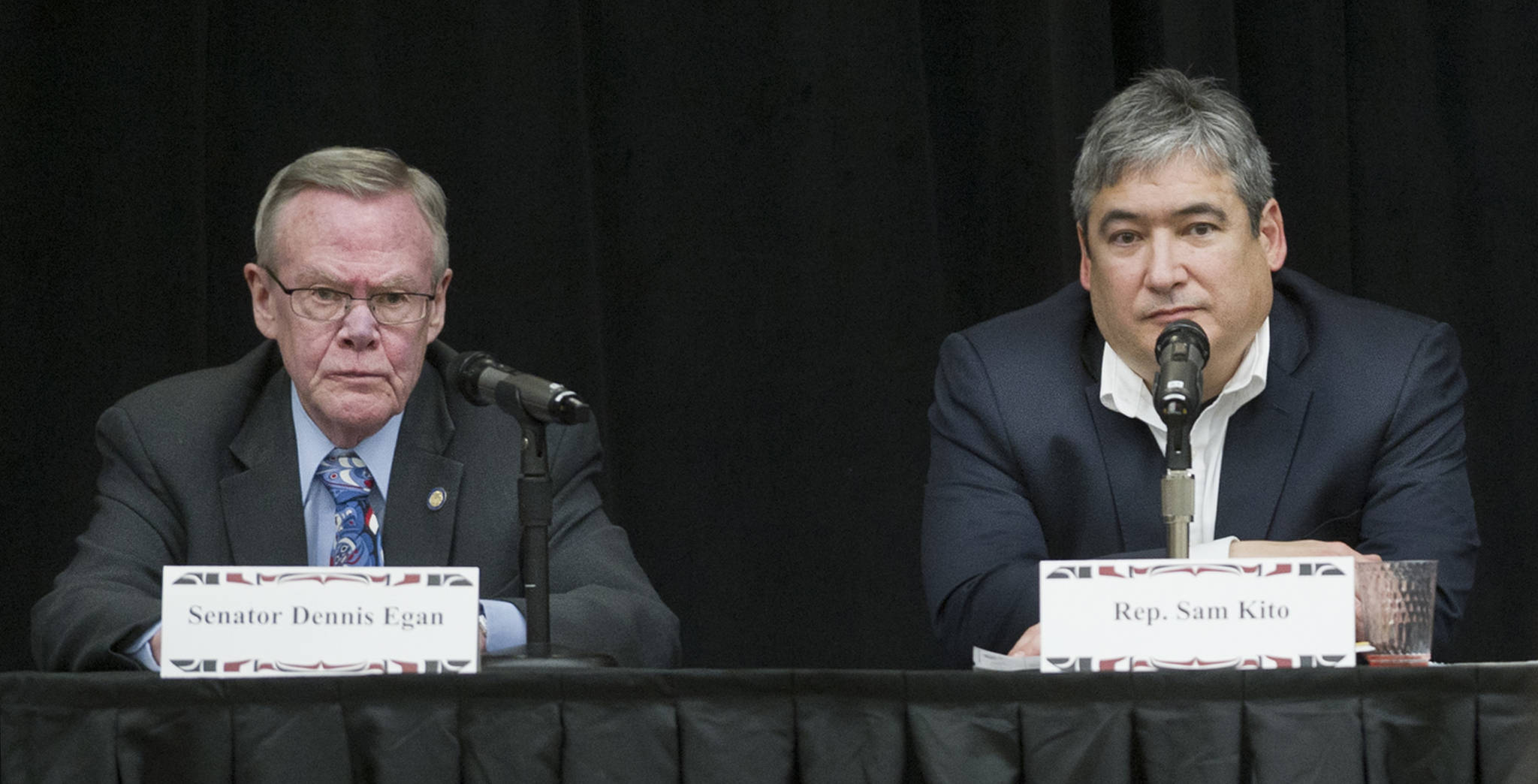Two of three Juneau lawmakers in the Alaska Legislature may not run for re-election this year.
Rep. Sam Kito III, D-Juneau, told the Empire he may not be able to afford to stay in the Legislature if lawmakers’ per diem expense payments are cut.
“I’m going to have to look at my finances,” Kito, who was appointed to office in 2009, told the Empire after a town hall meeting.
Sen. Dennis Egan, D-Juneau, is also still considering whether to run for another term. The former “Problem Corner” host and radio station owner told KINY that he will announce his decision Feb. 6 on the air. Egan, who is 70 years old, suffers from chronic health problems.
The third member of Juneau’s legislative delegation, Democratic Rep. Justin Parish, has already filed a letter of intent to run for re-election and has begun fundraising.
For Kito, the situation is more complicated. Lawmakers earn $50,400 per year in salary, but they can also collect per diem, money distributed on a daily basis for food, clothing and lodging. A week before the Legislature convened here, members of the State Officers Compensation Commission recommended that per diem end for lawmakers who live within 50 miles of the place the Legislature works. As long as the Legislature convenes in Juneau, that applies only to Juneau’s three lawmakers: Kito, Egan, and Rep. Justin Parish, D-Juneau.
Kito is a single parent and homeowner with a daughter in college, and while he’s normally an engineer, he said he hasn’t had the ability to do engineering work because the Legislature was in session for 211 days last year.
The salary commission’s recommendations will go into effect within 60 days of the Legislature’s start unless lawmakers pass a bill specifically rejecting them.
Kito told the Empire he doesn’t think it appropriate to introduce one himself. In addition to being one of the few lawmakers affected by the impending cut, he is chairman of the Legislative Council, which governs the internal workings of the Legislature, including the disposition of per diem.
Rep. David Guttenberg, D-Fairbanks, said he has a bill drafted to reverse the cut for the three Juneau lawmakers, but he hasn’t yet introduced it, and he might not. He said his concern was that the commission may have acted rashly.
“They had no deliberative process. They had basic questions where they didn’t have answers, but they still acted,” Guttenberg said. “No matter what their recommendation would have been, I would have said the same thing.”
Even if Guttenberg’s bill is introduced, it doesn’t appear likely to pass. If anything, lawmakers are more likely to extend the cuts to per diem, something that has been vocally demanded by constituents seeking cost-cutting measures.
Per diem isn’t a significant part of the state budget, but action to cut it has been seen as a powerful symbol.
Last year, House lawmakers voted 34-5 to cut per diem by 75 percent for all lawmakers. That change was reversed in the final version of the state budget, but other efforts are continuing. Two House lawmakers are among the sponsors of a ballot measure that would, among other things, reduce per diem if lawmakers fail to pass a budget on time. A bill by Sen. Peter Micciche, R-Soldotna, would also cut per diem for an untimely budget, albeit to a different degree.
Kito said the prospect of further cuts is having an effect beyond his front door. He believes fewer highly qualified people are considering runs for public office because doing so would mean a big pay cut.
“A lot of people who are qualified didn’t put their names in for the District 40 seat,” he said, pointing to the opening caused by the resignation of Rep. Dean Westlake. “They couldn’t afford to apply.”
Jay Parmley, executive director of the Alaska Democratic Party, said he wasn’t sure about District 40 in particular, but in general, the lower the pay, the fewer people are willing or able to apply to run for office.
“I would say this: The lower the pay, it reduces the ability of some people to run, and it decreases our diversity of candidates. I do believe that,” he said.
In Juneau, if neither Kito nor Egan run for re-election, one of the top candidates to replace either is Jesse Kiehl, a longtime Egan staffer and member of the City and Borough of Juneau Assembly. When Kito was appointed to his current seat by then-Gov. Sean Parnell (Kito has since won election on his own merits), Kiehl was one of the finalists passed over by Parnell.
Kiehl said rules on campaigning by Legislative staff prohibit him from commenting on the issue, but filings with the Alaska Public Offices Commission offer a clue on Kiehl’s interest. Kiehl is prohibited from running for another term on the CBJ Assembly by term limits, but at the end of his latest campaign, he rolled remaining funds into a future campaign account. Alaska law allows that account to be used for state-level elections.
The final date for candidates to file for statewide office is June 1. The primary election is Aug. 21, and the general election is Nov. 6.
• Contact reporter James Brooks at james.k.brooks@juneauempire.com or call 523-2258.

